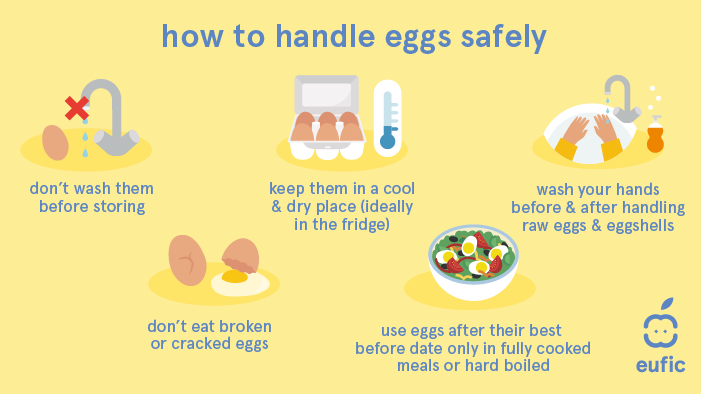Raw eggs last about 3-5 weeks in the fridge. Proper storage can extend their freshness and prevent spoilage.

Eggs are a staple in many households, providing a versatile ingredient for various dishes. Knowing how long raw eggs last and how to store them properly can help maintain their quality and reduce food waste. Keeping eggs at a consistent, cool temperature in the fridge is crucial.
Store them in their original carton to protect them from absorbing solid odors and to reduce moisture loss. By following these simple storage tips, you can ensure that your eggs stay fresh and safe to consume for as long as possible.

Credit: www.healthline.com
Introduction To Egg Storage
Eggs are a staple in many kitchens. They are versatile and nutritious. But how long do raw eggs last in the fridge? Proper storage is crucial for maintaining their freshness and safety.
Importance Of Proper Storage
Proper storage of eggs is essential. It helps preserve their quality and extends their shelf life. Store eggs in their original carton. This protects them from absorbing strong odors and flavors from other foods. The carton also helps prevent moisture loss.
Keep eggs in the coldest part of the fridge. The temperature should be below 40°F (4°C). The door is not suitable because it experiences frequent temperature changes. Always store eggs with the pointed end down. This keeps the yolk centered and extends freshness.
Risks Of Improper Storage
Improper storage of eggs can lead to contamination. Bacteria such as Salmonella can multiply at higher temperatures. This can cause foodborne illnesses. Symptoms include diarrhea, fever, and stomach cramps.
Storing eggs at room temperature increases these risks. The quality of the egg declines faster. The yolk and white become runny, and the egg may develop an off smell.
Here are some signs of a rotten egg:
- Unpleasant odor
- Shell is cracked or slimy
- Egg white is watery or cloudy
Always check the expiration date on the carton. Discard any eggs that are past their prime.

Credit: www.purinamills.com
Raw Egg Shelf Life
Understanding the shelf life of raw eggs is vital for food safety. It helps prevent foodborne illnesses. Proper storage can extend the life of raw eggs. Let’s explore the factors that affect their shelf life and typical duration in the fridge.
Factors Affecting Shelf Life
Several factors can influence how long raw eggs last in the fridge. Here are some key factors:
- Temperature: Keep eggs at a consistent temperature of 40°F (4°C).
- Packaging: Store eggs in their original carton. This prevents moisture loss and protects them from strong odors.
- Freshness: Fresher eggs last longer. Check the pack date on the carton.
- Handling: Avoid washing eggs before storage. Washing can remove the protective coating.
Typical Duration In The Fridge
The typical duration raw eggs can last in the fridge is:
| Condition | Duration |
|---|---|
| Unopened carton | 3 to 5 weeks |
| Opened carton | 3 to 4 weeks |
Remember to check for signs of spoilage. Bad eggs will have an off smell or unusual appearance.
Store eggs properly to enjoy fresh and safe meals.
Signs Of Spoilage
Knowing the signs of spoilage is essential to ensure your raw eggs are safe to eat. Spoiled eggs can cause foodborne illnesses. Here are some ways to check if your eggs have gone bad.
Visual Cues
Inspect the egg shell for cracks or slime. A cracked shell could mean bacteria have entered. Slime on the shell is a clear sign of contamination.
Open the egg and check the egg white and yolk. A fresh egg will have a thick egg white and a firm yolk. If the egg white is runny or the yolk is flat, the egg is old.
Look for any unusual colors. A pink, green, or iridescent egg white signals bacterial growth.
Smell Test
The smell test is a quick way to identify a bad egg. Crack the egg into a bowl and take a sniff.
If the egg smells sulfurous or rotten, it is no longer safe to eat. Fresh eggs have a neutral smell. Trust your nose; a bad egg has a strong, unpleasant odor.
| Sign | Indication |
|---|---|
| Cracked Shell | Bacterial Entry |
| Runny Egg White | Old Egg |
| Unusual Color | Bacterial Growth |
| Rotten Smell | Unsafe to Eat |
By knowing these signs of spoilage, you can keep your family safe. Always check your eggs before using them in your meals.
Optimal Storage Conditions
To ensure raw eggs stay fresh in the fridge, store them properly. Proper storage extends their shelf life and keeps them safe to eat. Pay attention to temperature and humidity levels.
Ideal Temperature
Raw eggs need to be kept at a consistent temperature. The best temperature for storing eggs is 40°F (4°C) or lower. This slows down the growth of bacteria and keeps the eggs fresh.
Place eggs in the coldest part of the fridge. Avoid storing them in the door, where temperatures fluctuate. A stable temperature ensures the eggs last longer.
Humidity Levels
Humidity also plays a role in keeping eggs fresh. The fridge should have moderate humidity levels. Too much moisture can cause the eggshell to become porous. This can lead to bacteria entering the egg.
To control humidity, consider using a fridge with a humidity control setting. Ensure the eggs are stored in their original carton. The carton helps maintain optimal humidity levels and protects the eggs from absorbing strong odors.
| Storage Tip | Reason |
|---|---|
| Store in the coldest part of the fridge | Keeps temperature stable |
| Maintain moderate humidity | Prevents bacteria growth |
| Keep eggs in original carton | Protects from odors and maintains humidity |
Best Practices For Storage
Storing raw eggs properly is crucial to keep them fresh. Follow these best practices to ensure your eggs last as long as possible.
Original Carton Vs. Egg Holder
Original cartons are designed to protect eggs. The carton shields them from absorbing strong odors. It also reduces moisture loss. The expiration date is also printed on the carton. This helps you keep track of the shelf life.
Egg holders look nice but are less effective. They expose eggs to more air and potential contaminants. This can shorten their shelf life. For best results, keep eggs in their original carton.
Placement In The Fridge
Where you place your eggs in the fridge matters. The fridge door is not the best spot. The temperature there fluctuates more. This can affect the eggs’ freshness.
Store eggs on an inside shelf instead. The temperature is more stable there. This helps maintain the eggs’ quality longer. Ideally, keep them in the coldest part of the fridge, usually the back.
| Storage Method | Pros | Cons |
|---|---|---|
| Original Carton | Protects eggs, prevents odor absorption, provides expiration date | May not look as tidy |
| Egg Holder | Visually appealing, easy access | Less protection, quicker moisture loss |

Credit: www.eufic.org
Extending Shelf Life
When keeping raw eggs fresh, extending their shelf life is important. Proper storage techniques can help keep eggs safe and edible for longer periods. This section will cover the best methods for extending the shelf life of raw eggs.
Freezing Eggs
Freezing eggs is a great way to extend their shelf life. Here’s how you can do it:
- Whole Eggs: Crack the eggs into a bowl and beat until blended. Pour the mixture into ice cube trays or freezer-safe containers.
- Egg Whites: Separate the yolks from the whites. Pour the whites into ice cube trays or freezer-safe containers.
- Egg Yolks: Beat the yolks and add a pinch of salt or sugar to prevent thickening. Pour the yolks into ice cube trays or freezer-safe containers.
Frozen eggs can last up to one year. Label the containers with the date for easy tracking.
Using Preservatives
Preservatives can help extend the shelf life of raw eggs. Two common methods include:
- Mineral Oil: Coat the eggs with a thin layer of food-grade mineral oil. This seals the eggs and keeps bacteria out. Store the eggs in the fridge for up to six months.
- Lime Solution: Mix one part lime (calcium hydroxide) with ten parts water. Soak the eggs in the solution for 24 hours. Rinse and store them in the fridge. This method can extend the shelf life up to six months.
Using these methods can help keep your raw eggs safe and fresh. Proper storage is key to enjoying eggs longer and reducing waste.
Safety Precautions
Understanding the safety precautions for handling raw eggs is crucial. This ensures you and your family remain healthy. Raw eggs can harbor bacteria like Salmonella. Proper storage and handling minimize these risks.
Handling Raw Eggs
Always wash your hands before and after touching raw eggs. This prevents the transfer of bacteria. Use clean utensils and surfaces when working with raw eggs. Never crack eggs on the edge of a bowl. This can introduce bacteria from the shell into the egg.
Inspect eggs before use. Discard any cracks or a bad smell. Store eggs in their original carton. This helps keep them fresh and safe. Ensure your fridge is set at 40°F (4°C) or lower.
Preventing Cross-contamination
Cross-contamination can spread bacteria from raw eggs to other foods. Keep raw eggs separate from ready-to-eat foods. Use a separate cutting board for eggs and other ingredients.
| Action | Why It’s Important |
|---|---|
| Wash hands and utensils | Removes bacteria |
| Use separate cutting boards | Prevents cross-contamination |
| Store eggs in their carton | Keeps eggs fresh and safe |
| Check fridge temperature | Ensures proper storage |
Always clean surfaces with hot, soapy water after handling eggs. This ensures no bacteria remain on your counters. Use paper towels to dry surfaces. This helps avoid spreading bacteria.
Do not reuse any bowls or utensils that touch raw eggs. This can reintroduce bacteria. Keep these tips in mind to keep your kitchen safe.
Using Older Eggs
Using older eggs can be a smart way to reduce waste and save money. If stored correctly, older eggs can still be useful in many culinary applications. Below are some practical tips and safety considerations for using older eggs in your cooking.
Culinary Uses
Older eggs are perfect for certain dishes where freshness is not crucial. Here are some ideas:
- Boiled Eggs: Older eggs are easier to peel after boiling.
- Baking: Use older eggs in cakes, cookies, and muffins.
- Scrambled Eggs: Older eggs work well for scrambled eggs and omelets.
- Quiches and Frittatas: Perfect for adding to egg-based dishes.
Safety Considerations
Safety is crucial when using older eggs. Follow these tips to ensure your eggs are safe:
- Check the Expiration Date: Always verify the expiration date on the carton.
- Perform the Float Test: Place the egg in water. If it floats, discard it.
- Inspect for Cracks: Do not use eggs with cracks.
- Smell Test: Crack the egg into a bowl and smell it. A bad egg will have a foul odor.
Following these tips, you can safely use older eggs in your cooking. Enjoy your dishes while reducing waste!
Frequently Asked Questions
What is the Best Way to Store Uncooked Eggs?
Store uncooked eggs in their original carton in the refrigerator. Keep them on a middle shelf, not the door.
How Long Should I Keep Cracked Eggs in the Fridge?
Keep cracked eggs in the fridge for up to two days. Store them in a clean, sealed container. Always cook thoroughly before consuming.
Does Refrigerating Eggs Extend Shelf Life?
Yes, refrigerating eggs extends their shelf life. Stored in the fridge, eggs can last up to five weeks. This slows bacterial growth, keeping them fresh longer. Always store eggs in their original carton to protect them.
Can You Keep Raw Beaten Eggs in the Fridge?
Yes, you can keep raw beaten eggs in the fridge. Store them in an airtight container and use within two days.
Conclusion
Understanding the shelf life of raw eggs is essential for food safety. Store eggs in the fridge to extend freshness. Always check for signs of spoilage before use. Follow these tips for proper storage and enjoy the benefits of fresh eggs longer.
Keep your kitchen safe and your meals delicious.


GIPHY App Key not set. Please check settings